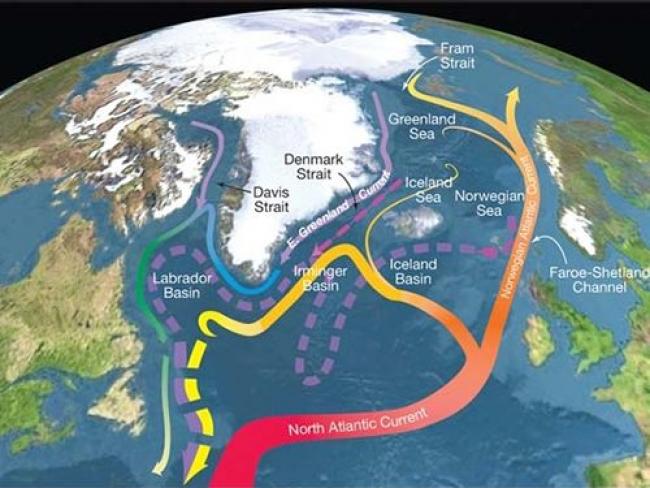Articles Menu

FEBRUARY 28, 2021
Evidence is growing that a critical part of the Atlantic Ocean’s circulation system is weaker than it’s been in 1,000 years, a climate-driven change that could someday have a major impact on both the European climate and the fishing economies of the U.S. East Coast.
“The Atlantic meridional overturning circulation (AMOC), a system of currents that includes the Florida Current and the Gulf Stream, is now ‘in its weakest state in over a millennium’,” writes The Washington Post. The new research, recently published in the journal Nature Geoscience, is a collaboration between the Potsdam Institute, Ireland’s Maynooth University, and University College London.
The team of scientists sought to buttress earlier studies suggesting the AMOC has been undergoing a rapid deceleration, by about 15%, since 1950. Because the enormous current system has only been directly measured for less than 20 years—“too short a period to definitively established a trend,” notes the Post—the new research used a statistical analysis of 11 pieces of indirect, “proxy” evidence instead. They include a “cold blob” of water that is currently stuck off the coast of Greenland, and a warm mass of water that is idling in the Gulf of Maine.
With nine of these proxies discovered to be in sync with the theory, the researchers declared a clear trend towards AMOC deceleration.
Also known as the global ocean conveyor belt, the AMOC “redistributes heat worldwide,” explains the Post. Warm, salty water from the tropics flows northward up America’s East Coast, begins to cool and descend around Greenland, then swings back southward until it hits Antarctica, where it then turns northward again.
The deceleration is likely being caused by the climate crisis, as “a combination of more rain and snow, more melting of Arctic sea ice, and huge freshwater pulses from Greenland” collectively make northern waters less salty (and therefore less dense), which in turn disrupts thermohaline circulation, the finely-calibrated temperature-to-salt gradient along which the global conveyor flows.
While the AMOC has been called the “Achilles heel” of the climate, with the potential power to “flip” conditions across the Northern Hemisphere, the Post says scientists currently don’t expect anything so dramatic to take place in the near future.
“However,” the news story adds, “they note that even the modest slowing of 15% has been accompanied by odd temperature patterns in the ocean and the significant upending of certain key fisheries, such as lobster and cod off the coast of New England.”
[Top image: R. Curry, Woods Hole Oceanographic Institution/Science/USGCRP]